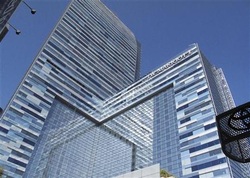By Deena Beasley
LOS ANGELES | Tue Feb 15, 2011 8:52pm IST
LOS ANGELES | Tue Feb 15, 2011 8:52pm IST

(Reuters) - Hotel operator Marriott International Inc (MAR.N) said on Monday it plans to split into two publicly traded companies by spinning off its timeshare operations into a separate company, sending its shares up nearly 5 percent after hours.
Marriott also reported a higher quarterly profit as a strengthening economy enabled more companies to send employees back out on the road to do business.
"Historically, timeshare has been seen as a drag on the valuations of publicly traded companies," said Hudson Securities analyst Robert LaFleur. "It's a real estate-intensive business that was pretty severely impacted by the recession. Sales are not anywhere near where they were three or four years ago."
Marriott's shares were trading at $42.85 after closing at $41 on the New York Stock Exchange.
Under the spin-off plan, Marriott said, the new company will focus on the timeshare business under the Marriott and Ritz-Carlton brands. Marriott International will concentrate on the lodging management and franchise business.
The company reported fourth-quarter net income of $173 million, or 46 cents per share, compared with $106 million, or 28 cents per share, a year earlier.
Adjusting for one-time items, Marriott earned 39 cents a share, beating the 36 cents a share expected by analysts, according to Thomson Reuters I/B/E/S.
"The numbers look OK, but they are not spectacular," said LaFleur, estimating that Marriott pocketed about 4 cents a share during the quarter due to a lower than expected taxes.
In 2010, Marriott said its timeshare segment reported revenue of around $1.5 billion. At the end of last year, it operated 71 timeshare and fractional resorts with more than 400,000 owners and some 10,000 employees -- it also held $1.5 billion in unsold inventory.
Marriott, the fourth-largest hotel company by room count, according to Smith Travel Research, serves more business than leisure travellers and has hotel brands such as Ritz-Carlton and Courtyard in all market categories with the exception of economy.
Like rival Starwood Hotels & Resorts Inc (HOT.N), which is smaller but has a similar focus on the upscale and business traveller, Marriott benefited early from the business-led recovery in lodging. Business travel generates about 70 percent of Marriott's revenue, the company says.
Growth of Marriott's revPAR -- a key industry measure that multiples occupancy by room rate -- turned positive in March 2010 after being decimated by recession. The industry ended 2010 with revPAR up 5.6 percent, but so far leisure travel has lagged the broader recovery.
For 2011, Marriott said it expects a strong pricing environment and assumes full-year systemwide revPAR will increase by between 6 percent and 8 percent on a North American and worldwide basis.
After a special dividend, the Marriott family is expected to hold around 21 percent of the outstanding common stock of each company. (Additional reporting by Helen Chernikoff; Editing by Steve Orlofsky)
Marriott also reported a higher quarterly profit as a strengthening economy enabled more companies to send employees back out on the road to do business.
"Historically, timeshare has been seen as a drag on the valuations of publicly traded companies," said Hudson Securities analyst Robert LaFleur. "It's a real estate-intensive business that was pretty severely impacted by the recession. Sales are not anywhere near where they were three or four years ago."
Marriott's shares were trading at $42.85 after closing at $41 on the New York Stock Exchange.
Under the spin-off plan, Marriott said, the new company will focus on the timeshare business under the Marriott and Ritz-Carlton brands. Marriott International will concentrate on the lodging management and franchise business.
The company reported fourth-quarter net income of $173 million, or 46 cents per share, compared with $106 million, or 28 cents per share, a year earlier.
Adjusting for one-time items, Marriott earned 39 cents a share, beating the 36 cents a share expected by analysts, according to Thomson Reuters I/B/E/S.
"The numbers look OK, but they are not spectacular," said LaFleur, estimating that Marriott pocketed about 4 cents a share during the quarter due to a lower than expected taxes.
In 2010, Marriott said its timeshare segment reported revenue of around $1.5 billion. At the end of last year, it operated 71 timeshare and fractional resorts with more than 400,000 owners and some 10,000 employees -- it also held $1.5 billion in unsold inventory.
Marriott, the fourth-largest hotel company by room count, according to Smith Travel Research, serves more business than leisure travellers and has hotel brands such as Ritz-Carlton and Courtyard in all market categories with the exception of economy.
Like rival Starwood Hotels & Resorts Inc (HOT.N), which is smaller but has a similar focus on the upscale and business traveller, Marriott benefited early from the business-led recovery in lodging. Business travel generates about 70 percent of Marriott's revenue, the company says.
Growth of Marriott's revPAR -- a key industry measure that multiples occupancy by room rate -- turned positive in March 2010 after being decimated by recession. The industry ended 2010 with revPAR up 5.6 percent, but so far leisure travel has lagged the broader recovery.
For 2011, Marriott said it expects a strong pricing environment and assumes full-year systemwide revPAR will increase by between 6 percent and 8 percent on a North American and worldwide basis.
After a special dividend, the Marriott family is expected to hold around 21 percent of the outstanding common stock of each company. (Additional reporting by Helen Chernikoff; Editing by Steve Orlofsky)


 RSS Feed
RSS Feed